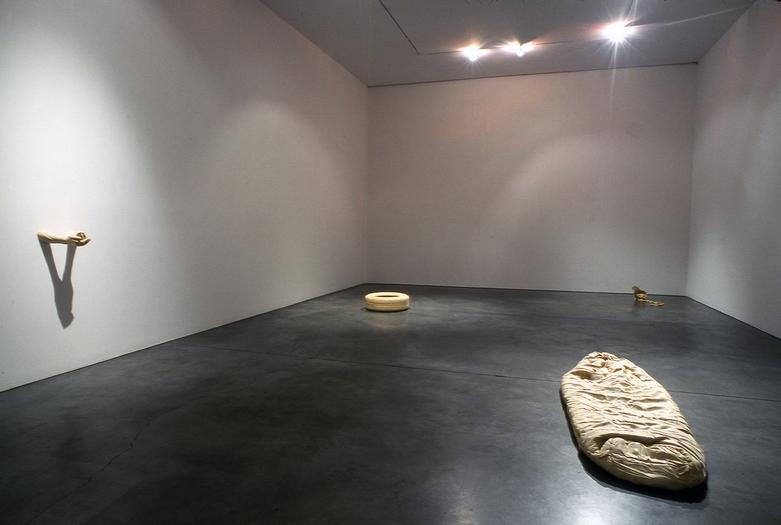Ricky Swallow
Tomorrow in Common
September 5 – October 12, 2002
Gallery 2
Andrea Rosen Gallery's September 2000 exhibition, ‘Keith Edmier, Ricky Swallow and Erick Swenson', featured a tabletop installation by Ricky Swallow. Swallow's piece was a monochrome pale gray, a meticulously hand crafted future-scape that physically and psychologically played on our ideas about the near future and the obsolescence of technology. Built on top of fleeting objects of the past (turn-tables and tape decks), a moving part of the old appliance animated the miniature modeled worlds and sci-fi scenarios. We were very much looking forward to seeing what would come next…
For his current show at Andrea Rosen Gallery, his first solo exhibition in New York, Swallow has made 1:1 scale arduously hand-carved wood sculptures. Between the monochrome of the material and the slightly askew juxtapositions, such as a catfish curled snug within the curve of a tire, an awkward sense of looking at an artifact from an undeterminable time is projected. Almost all of the objects in the show resemble what might be left behind, perhaps the contents of a drained river, and it is unclear if we are looking at the first or last of our remains.
The juxtaposed objects synthesize and accommodate each other and, similar to Swallow's larger sculptures and turntable pieces, they often appear as extrapolated and enlarged details from the spaces and ideas contained in those environments. The wood of Swallow's newest work is very related to the blank or uninitiated materials he has used in the past and it extends this logic of the pieces being pre-event, like the industrial - prototyped grays of the turntables. Objects that have lived out an idea are slowly wearing out their meanings. A baseball cap is anchored down by a chain, or occupied with something so heavy but flexible as if the previous occupant has been reduced to a reproducible system...or as if the cap is like a brain with attached spine... Another piece in the show is a pair of cupped hands that encouragingly, almost plaintively, offer a mix of pills and seeds suggesting that our sustenance is no longer derived from nature alone. A sleeping bag lies abandoned and pale; yet celebrated because of the toil that made it.
It is difficult to come to a full stop when thinking about Swallow's work because the meaning is constantly overlapping. We willingly fall prey to the beauty of the object and Swallow lets us succumb to this passion but also encourages us to put it in context. Perhaps our fascination with what might remain after the big destruction, relates to our similarly morbid preoccupation within contemporary art, and specifically sculpture, which has become partially about making objects that can be left behind for the next generations to discover; constantly aware of imminent mortality. Swallow seems to choose his objects and method of working with these ideas in mind, both as a comment on our seeming need for the dream and demise that science fiction allows for as well as our need to experience, make, and possess art objects it as if we were pre-creating artifacts of our own time.
Ricky Swallow is from Australia, and is temporarily living and working is Los Angeles. In 1999 he was included in the Melbourne International Biennial and was awarded the Contempora 5 prize for contemporary Australian art. Most recently, Swallow was in a group show at the Tate, "Remix", as well as included in the 1st Quadrennial of Contemporary Art, Ghent, Belgium, among other national and international exhibitions.
